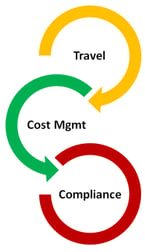Why Every Travel Management Company should embrace Bleisure
By David Eddy on Feb 4, 2016 7:00:00 AM

The release of BridgeStreet Global Hospital’s The Bleisure Report 2014 introduced a new term to the travel industry and revealed the idea of combining business and leisure travel – far from being outlandish – was a reality for a sizeable number of people and poised for growth. The report found that 83% of global business travelers take time on business trips to explore their destination cities and 37% add personal leave days to most or all of their trips. The key word to notice is “global” business travelers, because it makes all the sense in the world to maximize international airfares bought by employers.

Over the course of 2015, the compelling logic of complementing business and leisure in international trips kept it primarily a global phenomenon. Domestic applications of the concept began to grow, but limitations emerged. For example, senior management was more inclined to apply it to domestic trips than middle management, simply due to their different domestic circumstances. Upper management is more likely to be empty nesters, and tacking a weekend onto a Wed-Fri business trip is much easier than juggling a weekend schedule with school-age children.
Millennials are perhaps in the best position to take advantage of this new style of travel. A 2014 Pew Research Center report said only 26% of millennials are married, compared to 36% of Gen X and 48% of Baby Boomers at the same age; so they not only have flexible weekends but are unencumbered by college or health care expenses often borne by empty nesters.
The Travel Management Company Role
Unlike purely leisure, the vast majority of business travel is booked through a travel management company (TMC) under contract by the employer. In a very real sense, it is a third party which functions as a travel procurement agent with roles, responsibilities and clear expectations in three operational areas.
Employee Travel: The travel management company is expected to create employee travel value in two ways. From a procurement perspective, the company must have the expertise to negotiate favorable pricing, terms and conditions from travel suppliers; from a technology perspective, its B2B software should support those procured services; its B2 C software should have a highly intuitive GUI and innovative features to facilitate easy employee travel planning and booking.
C software should have a highly intuitive GUI and innovative features to facilitate easy employee travel planning and booking.
Cost Control: It has the responsibility to bend corporate travel costs into a downward arc and employ procurement procedures to insure those lower costs are sustainable. A key expectation is that it will drive cost reductions by applying economies of scale; a scale which should combine that provided by the TMC itself and scale from the client’s own travel volumes – optimized by its negotiation skills and supplier relationships.
Compliance: Its role is expected to maximize user compliance with corporate travel policies and procedures. It is expected to provide travel technology capable of: 1) enabling client management of real-time travel policy compliance (e.g. challenging a submitted reservation that violates the policy, and/or requiring specific approvals prior to booking), and; 2) management of travel expenses and savings through real-time dashboard reporting of key performance indicators.
Challenges & Opportunities for the TMC
How will combining business and leisure travel affect travel management roles and responsibilities? It’s impossible to say with any precision. The only certainty is more travel industry change is on its way and successful ones will use good customer relationships to creatively balance new possibilities with employer priorities and interests. That said, a few upcoming challenges and opportunities can already be observed.
Employee Travel: There will be real opportunities for travel management businesses to proactively suggest ways for employees to benefit in a win-win manner with their employer. For example, new software features to let employees easily see and use frequent flyer points to book spouse airfares that coordinate with their corporate bookings. Also, calendar software enhancements such that employees could import and view school holiday schedules alongside corporate travel itineraries.
Cost Control: The prospect of mutual benefits could create cost saving collaborations between employers and employees, particularly for those companies with a volume of international travel. As an example, an employer could grant leave days at the beginning or end of trips and the employee could reciprocate by traveling premium economy instead of business class. On many international routes that could save the company thousands while the employee protects vacation days.
Compliance: Perhaps the greatest challenge for a TMC and its corporate customer lies in this area. The pillars of a good travel policy are: travel is an effective business tool; rules are easily understood and fairly applied; it supports effective and transparent management. Unfortunately, the nature of this travel concept is such that not all employees are positioned to enjoy benefits equally. Will the middle manager understand their personal lifestyles make some Bleisure travel benefits problematic? Will they expect some other type of offsetting benefit? Will employees whose jobs rarely require international travel become resentful of colleagues spending extra free time in London?
This type of travel is still in its infancy and it’s difficult to see how it can avoid encountering ambiguous and problematic policy areas. In some companies, those friction points may limit the extent to which this concept can be implemented. However, Bleisure travel would not be growing and generating such interest if it was not seen by all parties, in a wide range of circumstances, as a beneficial change agent.
- travel technology (60)
- Travel Industry (49)
- travel agency (31)
- travel erp (31)
- travel trends (28)
- travel booking system (23)
- TINA (21)
- travel company (19)
- Tour Operator (18)
- Product updates (17)
- Travel Management Company (17)
- AIDA (15)
- TBS (15)
- Business Travel (14)
- dcs plus news (14)
- tour operator solution (14)
- travel website (14)
- travel erp system (13)
- Mobile App (12)
- Travel App (12)
- mid back office solution (12)
- trends (12)
- Corporate Travel (11)
- Industry Events (11)
- Mobile Technology (11)
- TMC (11)
- travel agents (11)
- erp (10)
- erp system (10)
- Tour Operators (9)
- Travel booking engines (9)
- dcs plus (9)
- online travel agency (9)
- travel agent (9)
- Mobile Bookings (8)
- travel (8)
- travel agencies (8)
- 2017 (7)
- Business Traveler (7)
- Mobile Travel (7)
- travel business (7)
- travel software (7)
- Digital Technology (6)
- Insider (6)
- Millennials (6)
- Online booking systems (6)
- Travel Management Companies (6)
- process automation (6)
- travel companies (6)
- Big Data (5)
- Partners interviews (5)
- Tour Operator Software (5)
- customer retention (5)
- travel agency technology (5)
- Booking engines (4)
- CSBT (4)
- Mobile Device (4)
- Mobile travel apps (4)
- OTAs (4)
- Static databases (4)
- Tour Companies (4)
- Travel Policy (4)
- Travel booking systems (4)
- Travel suppliers (4)
- back office automation (4)
- corporate self booking tool (4)
- millennial travelers (4)
- online travel (4)
- responsive travel website (4)
- technology (4)
- travel website conversion (4)
- 2016 (3)
- Content mapping (3)
- Databases (3)
- Demographics (3)
- Food and Adventure Tourism (3)
- Mobile Apps (3)
- Travel Distribution Channels (3)
- Travel Management Software (3)
- Travel customers (3)
- Travel history (3)
- anniversary (3)
- automated processes (3)
- content matching (3)
- global travel industry (3)
- social media (3)
- travel agency workflow (3)
- travel back office (3)
- travel marketing (3)
- travel process automation (3)
- AI in travel (2)
- Advanced Booking Systems (2)
- B2B Travel Resellers (2)
- Bleisure (2)
- Branding (2)
- Business Process Automation (2)
- Business Travelers (2)
- Customer engagement (2)
- Financial Reporting (2)
- Food Tourism (2)
- Inbound Marketing (2)
- Infographic (2)
- Leisure Travel (2)
- Saas (2)
- Templates (2)
- Travel Costs (2)
- Travel bookings (2)
- Travel start-up (2)
- Travel website abandonment (2)
- WTM 2016 (2)
- abandoned travel bookings (2)
- engagement marketing (2)
- internet booking engine (2)
- millennial traveler (2)
- new travel company (2)
- office (2)
- online reputation management (2)
- online travel reviews (2)
- reporting (2)
- software (2)
- start-up tips (2)
- travel agency management (2)
- travel agency website (2)
- travel experience (2)
- travel mobile app (2)
- travel packages (2)
- travel reservation system (2)
- travel system (2)
- travelers (2)
- web-based travel erp (2)
- 2020 (1)
- 360 Customer View (1)
- Advanced Accommodation Contract Management (1)
- Adventure travelers (1)
- Apps (1)
- B2B Reseller (1)
- B2B Resellers (1)
- B2C (1)
- BI Reporting (1)
- Budget traveler (1)
- Cancellations (1)
- Chat (1)
- Chinese millennial (1)
- Cloud (1)
- Cognitive computing (1)
- Comparison shopping (1)
- Conference (1)
- Contact matching (1)
- Content (1)
- Cruise (1)
- Culinary traveler (1)
- Customer relations (1)
- Digital Innovation (1)
- Digital Natives (1)
- Documents (1)
- Emerging market travelers (1)
- Emerging markets (1)
- Errors (1)
- Experimental travel (1)
- Financial Dashboard (1)
- Import rates (1)
- Instant messaging (1)
- Integrate with Accounting Software (1)
- Internet (1)
- Luxury traveler (1)
- Mobile Transaction (1)
- Mobile payments (1)
- NDC distribution (1)
- Operational Reporting (1)
- Reseller networks (1)
- Resellers (1)
- Response (1)
- Subagents Network (1)
- TINA Academy (1)
- TTE (1)
- Travel Reseller Network (1)
- Travel Revenue Management (1)
- Travel booking problems (1)
- Travel finance reporting (1)
- Travel stats (1)
- WTM (1)
- abandonment (1)
- accomodations (1)
- advanced reporting (1)
- airline direct connect technology (1)
- ancillary services (1)
- cloud computing (1)
- collection (1)
- collection challenges (1)
- common data model (1)
- conversion rates (1)
- corporate mobile app (1)
- cost control (1)
- credo ventures capital invests in dcs plus (1)
- customer reviews (1)
- data analysis (1)
- dcs plus credo investment (1)
- dcs plus credo ventures (1)
- deloitte technology fast 500 EMEA (1)
- digital transformation (1)
- e-invoicing KSA (1)
- email marketing (1)
- email marketing for OTAs (1)
- erp e-invoicing (1)
- lost travel bookings (1)
- modern travel agencies (1)
- networks (1)
- new features (1)
- offers (1)
- online customer review (1)
- online reputation (1)
- online travel agencies (1)
- risk management (1)
- sales (1)
- senior travelers (1)
- shopping baskets (1)
- shopping carts (1)
- social network (1)
- standardized processes (1)
- static content (1)
- travel SaaS (1)
- travel account services (1)
- travel agency customers (1)
- travel agency profitability (1)
- travel analytics (1)
- travel blog (1)
- travel planning (1)
- travel reviews (1)
- travel shopping carts (1)
- travel software for agencies (1)
- travel software system (1)
- travel technology europe (1)
- travlist smart mobile app (1)
- trend (1)
- trusted adviser (1)
- trusted advisor (1)
- upsell functionality (1)
- vouchers (1)
- website traffic (1)
- zatca (1)
Subscribe by email
You May Also Like
These Related Stories

How to Inspire Millennial Travelers (and grow your Travel Business)

Are Needless Expenses Killing your Travel Company?


No Comments Yet
Let us know what you think